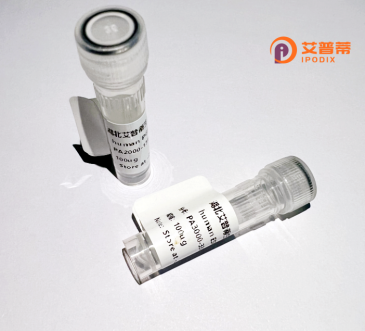
| 纯度 | >90%SDS-PAGE. |
| 种属 | Human |
| 靶点 | ASXL1 |
| Uniprot No | Q8IXJ9 |
| 内毒素 | < 0.01EU/μg |
| 表达宿主 | E.coli |
| 表达区间 | 1-84aa |
| 氨基酸序列 | MKDKQKKKKERTWAEAARLVLENYSDAPMTPKQILQVIEAEGLKEMSGTSPLACLNAMLHSNSRGGEGLFYKLPGRISLFTLKR |
| 分子量 | 35.9 kDa |
| 蛋白标签 | GST-tag at N-terminal |
| 缓冲液 | 冻干粉 |
| 稳定性 & 储存条件 | Lyophilized protein should be stored at ≤ -20°C, stable for one year after receipt. Reconstituted protein solution can be stored at 2-8°C for 2-7 days. Aliquots of reconstituted samples are stable at ≤ -20°C for 3 months. |
| 复溶 | Always centrifuge tubes before opening.Do not mix by vortex or pipetting. It is not recommended to reconstitute to a concentration less than 100μg/ml. Dissolve the lyophilized protein in distilled water. Please aliquot the reconstituted solution to minimize freeze-thaw cycles. |
以下是关于重组人多梳蛋白ASXL1的4篇参考文献的简要总结:
---
1. **文献名称**: *ASXL1 mutations promote myeloid transformation through loss of PRC2-mediated gene repression*
**作者**: Abdel-Wahab O, et al.
**摘要**: 研究揭示ASXL1突变通过干扰多梳抑制复合体2(PRC2)的活性,导致组蛋白H3K27三甲基化(H3K27me3)减少,进而解除对造血分化相关基因的抑制,促进白血病发生。
---
2. **文献名称**: *Loss of Asxl1 leads to myelodysplastic syndrome-like disease in mice*
**作者**: Inoue D, et al.
**摘要**: 在小鼠模型中,Asxl1缺失会扰乱骨髓分化并诱导类似骨髓增生异常综合征(MDS)的表型,表明ASXL1在维持正常造血干细胞功能中的关键作用。
---
3. **文献名称**: *ASXL1 interacts with the cohesin complex to maintain genomic stability*
**作者**: Balasubramani A, et al.
**摘要**: 发现ASXL1通过结合染色质结构蛋白cohesin复合体,参与DNA修复和基因组稳定性调控,其功能缺失可能导致癌变和发育异常。
---
4. **文献名称**: *Structural basis of ASXL1-mediated activation of the BAP1 deubiquitinase*
**作者**: Chou DM, et al.
**摘要**: 通过结构生物学分析,阐明ASXL1的C端结构域与去泛素化酶BAP1结合并激活其功能的分子机制,揭示了二者协同调控靶基因表达的分子基础。
---
这些文献涵盖了ASXL1在表观遗传调控、疾病模型、基因组稳定性及结构机制等方面的关键研究。
The ASXL1 (Additional Sex Combs-Like 1) protein, a member of the ASXL family, plays a critical role in epigenetic regulation as part of Polycomb repressor complexes (PRC1 and PRC2). It modulates chromatin structure and gene expression by influencing histone modifications, notably promoting H2AK119 ubiquitination (PRC1-mediated) and interacting with PRC2 to regulate H3K27 trimethylation. ASXL1 also facilitates the deubiquitination of histone H2A through BAP1 complex association, impacting transcriptional activation. Somatic mutations in ASXL1 are recurrent in myeloid malignancies (e.g., AML, MDS) and linked to poor prognosis, often resulting in truncation variants that disrupt its normal regulatory functions. Germline mutations cause Bohring-Opitz syndrome, a neurodevelopmental disorder. Recombinant human ASXL1 is utilized in biochemical studies to dissect its role in chromatin dynamics, investigate mutation-specific effects on hematopoiesis, and screen therapeutic agents targeting ASXL1-mutant pathways. Its dual roles in transcriptional repression/activation and frequent alteration in diseases highlight ASXL1 as a pivotal factor in both developmental biology and oncogenesis.
×